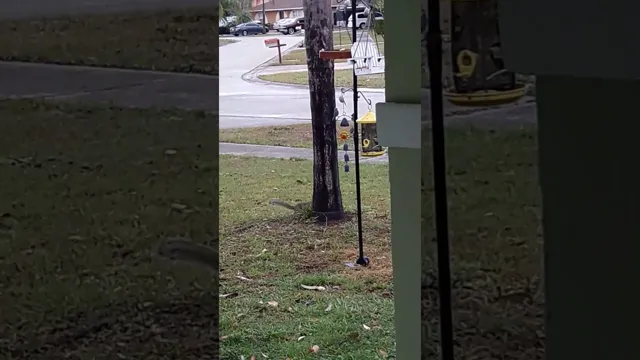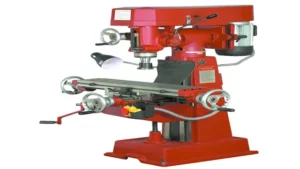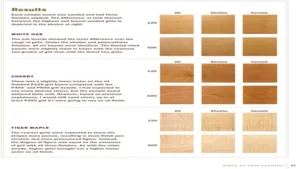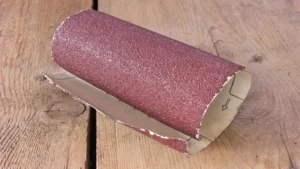Have you ever found yourself in a situation where you’re enjoying the beautiful birds feeding from your bird feeder, only to notice that the feeder pole is squeaking or wobbling? It’s a common problem that many birdwatchers face. The solution is simple: you need to lubricate the pole with the right grease. But what grease should you use? Using the wrong type of grease can be harmful to the birds and the environment.
You don’t want to risk harming these beautiful creatures that bring so much joy to your backyard. In this blog, we’ll break down the different types of grease you can use on your bird feeder pole and provide tips on how to properly apply it. By the end of this blog, you’ll be able to enjoy bird watching without any annoying squeaks or wobbles from your feeder pole.
Understanding the Importance of Grease for Bird Feeder Poles
If you’re an avid bird watcher, you know that keeping a bird feeder pole in good condition is key to attracting your feathered friends. That’s where grease comes in. Grease helps prevent rust and corrosion from developing on your bird feeder pole, extending its lifespan and keeping it in tip-top shape.
But what kind of grease should you use? When it comes to choosing a grease for your bird feeder pole, it’s important to choose one that’s safe for birds and won’t harm them. Look for a food-grade grease that’s non-toxic and won’t seep into the birdseed. Avoid petroleum-based greases which can be harmful to birds if ingested.
Instead opt for vegetable-based greases such as coconut oil or petroleum-free lubricants. Keep your bird feeder pole well-greased and your feathered friends will thank you for it!
Preventing Rust and Corrosion
As a bird lover, you want to keep your feathered friends happy and fed. But with bird feeder poles often exposed to the elements, rust and corrosion can set in and ruin your feeders. That’s where grease comes in.
By applying a thin layer of grease to your pole, you’re creating a protective barrier that prevents water and oxygen from reaching the metal, ultimately slowing down the process of rust and corrosion. Think of it like sunscreen for your bird feeder pole – just as you wouldn’t go out in the sun without protection, don’t leave your pole exposed without a layer of grease. So next time you’re checking up on your bird feeders, don’t forget to grab the grease and give your pole a good coating.
Your feathered friends will thank you.

Inhibiting the Growth of Bacteria and Fungi
As bird lovers, we all want to ensure our feathered friends have a safe and healthy environment to enjoy their meals. One way to do this is by using grease on our bird feeder poles. Not only does grease inhibit the growth of harmful bacteria and fungi, but it also helps to protect the integrity of the pole itself.
Grease can prevent rust and decay caused by exposure to the elements, ensuring your feeder is sturdy and long-lasting. Plus, watching birds happily munch away at their food without worrying about contamination is a joy in and of itself. So, next time you’re setting up your bird feeder, don’t forget to give the pole a good coat of grease – your avian friends will thank you for it!
Types of Grease for Bird Feeder Poles
If you’re a bird lover with a bird feeder pole in your backyard, you might be wondering what type of grease to use on your pole to keep pesky squirrels from climbing up and stealing bird seed. There are a few different types of grease that work well for bird feeder poles, and the best one for you will depend on your specific situation. One popular option is petroleum jelly, which is inexpensive and easy to find.
It’s also safe for birds if they happen to come into contact with it while using the feeder. Another option is specialized squirrel-proofing grease, which is formulated specifically to repel squirrels. This grease is often more expensive than petroleum jelly, but it’s highly effective and can last longer.
When applying any type of grease to your bird feeder pole, be sure to wear gloves to avoid getting the grease on your hands, and use a generous amount to ensure that it covers the entire pole. With the right type of grease, you can enjoy watching birds at your feeder without worrying about squirrels stealing their food.
Petroleum-Based Grease
When it comes to maintaining your bird feeder pole, choosing the right type of grease is essential. The most common type of grease for bird feeder poles is petroleum-based grease. This type of grease is effective in lubricating and protecting metal parts from rust and corrosion.
However, it is not recommended to be used near water sources or areas with wildlife as it could be harmful to animals. It is important to apply the grease sparingly and to wipe off any excess to prevent it from attracting dirt and debris. Remember to check the manufacturer’s instructions for proper use and application.
Using petroleum-based grease will help ensure your bird feeder pole is properly maintained and ready for birds to enjoy.
Silicone-Based Grease
If you have a bird feeder pole, it’s important to keep it lubricated to prevent it from getting rusty or squeaky. There are different types of grease available in the market, but the most effective one is silicone-based grease. This type of grease is waterproof, non-corrosive, non-toxic, and can withstand high temperatures.
It’s also safe for birds to be around and won’t harm them if they accidentally ingest it. Applying silicone-based grease to your bird feeder pole will protect it from the elements and keep it in top condition for longer. So, if you want to enhance the life of your bird feeder pole and enjoy watching birds visit your feeder, then invest in a good-quality, silicone-based grease and apply it regularly.
Vegetable-Based Grease
When it comes to choosing the right grease for your bird feeder pole, vegetable-based grease is a great option. This type of grease is made from plant-based oils and is biodegradable, making it eco-friendly. It’s also safe for birds to consume if they accidentally get some on their feathers while feeding.
Another benefit of vegetable-based grease is that it’s less likely to attract unwanted animals, such as raccoons or squirrels, who can damage or steal your bird feed. Overall, vegetable-based grease is a smart choice for bird enthusiasts who want to maintain a clean and safe feeding station.
Choosing the Right Grease for Your Bird Feeder Pole
When it comes to maintaining your bird feeder, choosing the right grease for your pole is crucial. You want a grease that is durable and long-lasting, while also being safe for birds. The best option is a non-toxic, petroleum-free grease, such as vegetable-based or silicone-based grease.
These types of grease will not harm birds if they come into contact with it, and will also protect your pole from corrosion and rust. It is important to avoid using traditional petroleum-based grease, as it can be toxic to birds and can also attract dirt and dust, which can clog the feeding holes on your feeder. By selecting the proper grease for your bird feeder pole, you can ensure that your feathered friends stay safe and healthy, while also prolonging the lifespan of your feeder.
Consider Your Bird Feeder Pole Material
When it comes to choosing the right grease for your bird feeder pole, consider the material of the pole itself. Different materials require different types of grease to ensure maximum efficacy. For example, if your pole is made of metal, you’ll want to use a heavy-duty grease that can withstand corrosion over time.
On the other hand, if your pole is made of wood, you’ll want a lighter, less sticky grease that won’t damage the wood or attract pests. A good rule of thumb is to look for greases that are long-lasting, weather-resistant, and safe for birds to come into contact with. By taking the time to choose the right grease for your feeder pole, you’ll ensure that your feathered friends stay safe, healthy, and well-fed all year long.
Remember, happy birds make for happy bird watchers!
Factor in the Climate and Weather Conditions in Your Area
When it comes to maintaining your bird feeder pole, choosing the right grease is key. However, it’s important to factor in the climate and weather conditions in your area when making your choice. For example, if you live in an area with high humidity or frequent rain, you’ll want to choose a waterproof grease to prevent moisture from causing rust and corrosion.
On the other hand, if you live in a dry climate, a thin lubricant or spray may be more suitable. It’s also important to consider the temperature range in your area, as extreme heat or cold can affect the effectiveness of certain grease types. Ultimately, taking the time to consider these factors and choose the right grease will help keep your bird feeder pole in top condition and attract a variety of feathered friends to your yard.
Application Tips to Ensure Optimal Grease Performance
If you want to keep your bird feeder pole well lubricated, choosing the right grease is key. Silicone or lithium-based greases are ideal for protecting against rust and corrosion, while also providing a waterproof barrier that helps to keep water out, even during heavy rain. When applying grease, it is important to use only a small amount, as using too much may attract dirt and debris, which can cause damage to your pole over time.
A good application tip is to wipe down the pole with a rag before applying grease to ensure it is clean. Finally, be sure to use a quality grease gun to apply the grease, as this will help to ensure even distribution and minimize waste. With the right grease and application technique, you can be confident that your bird feeder pole will remain in excellent condition for years to come.
Conclusion
In the end, it’s not the type of grease that matters, but the determination of the feathered friends who persistently perch and peck at their favorite feeder. Whether they’re feasting on sunflower seeds or suet, these avian adventurers will always find a way to get their fill, greased pole or not. So let’s grease up and watch the show unfold, because when it comes to our feathered friends, nothing is impossible!”
FAQs
What type of grease should I use on my bird feeder pole?
It is recommended to use a non-toxic, petroleum-free grease such as vegetable oil or silicone-based lubricant.
Can I use any type of grease on my bird feeder pole?
No, it is important to use a non-toxic, petroleum-free grease to avoid harming the birds and the environment.
How often should I apply grease to my bird feeder pole?
It is recommended to apply grease to the pole every few months or as needed to keep squirrels and other critters from climbing the pole.
What are the benefits of using a non-toxic grease on my bird feeder pole?
Non-toxic greases are safer for wildlife and the environment, and won’t harm the birds that come to your feeder.
Can I use vegetable oil as a substitute for grease on my bird feeder pole?
Yes, vegetable oil can be used as a non-toxic, eco-friendly substitute for grease on your bird feeder pole.
Are there any disadvantages to using petroleum-based grease on my bird feeder pole?
Yes, petroleum-based grease is harmful to wildlife and the environment and can leach into the soil and water, causing pollution.
How can I remove old grease from my bird feeder pole before applying new grease?
Use warm soapy water and a scrub brush to remove old grease from your bird feeder pole before applying new grease. Avoid using harsh chemicals or solvents.






